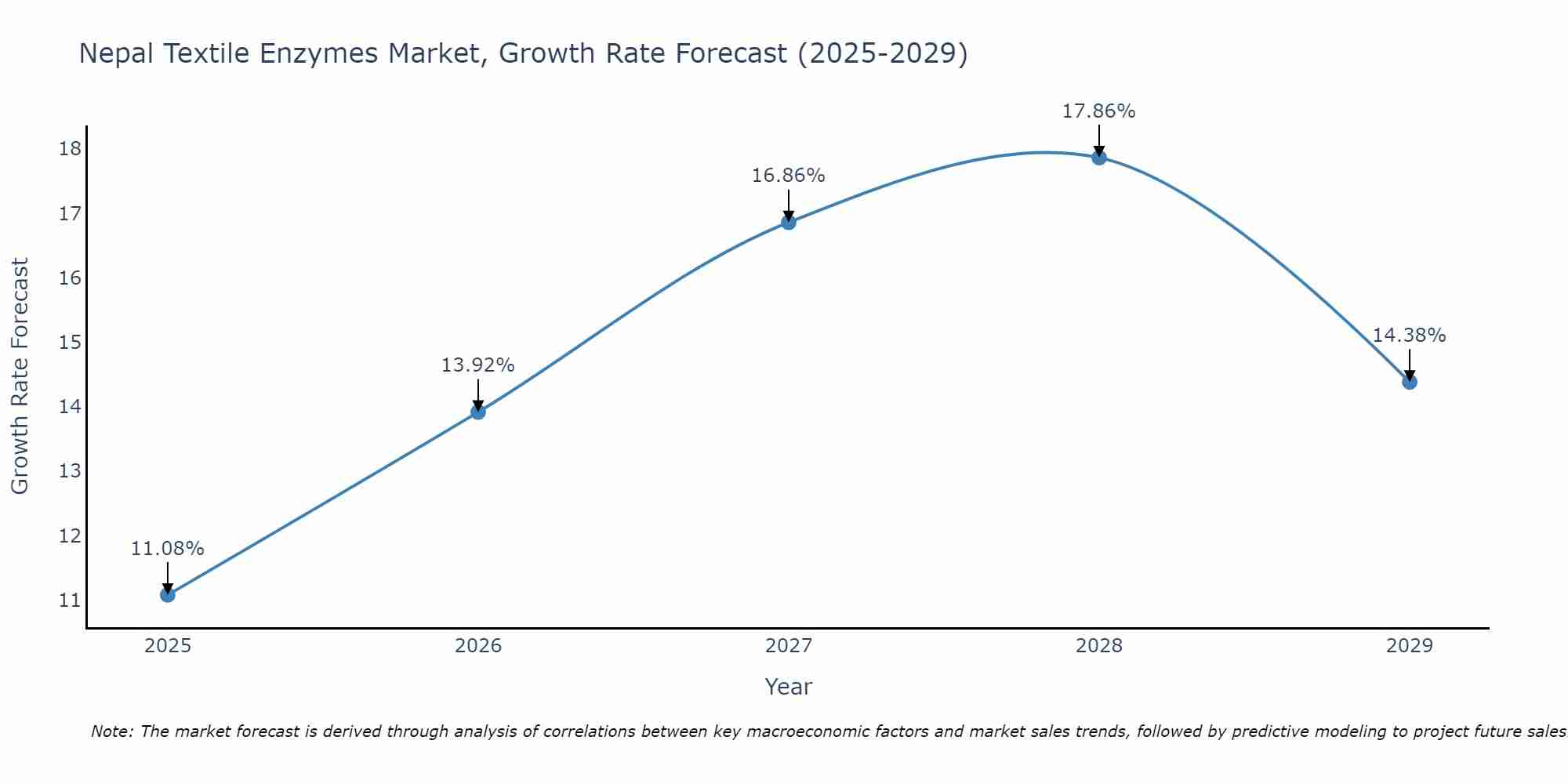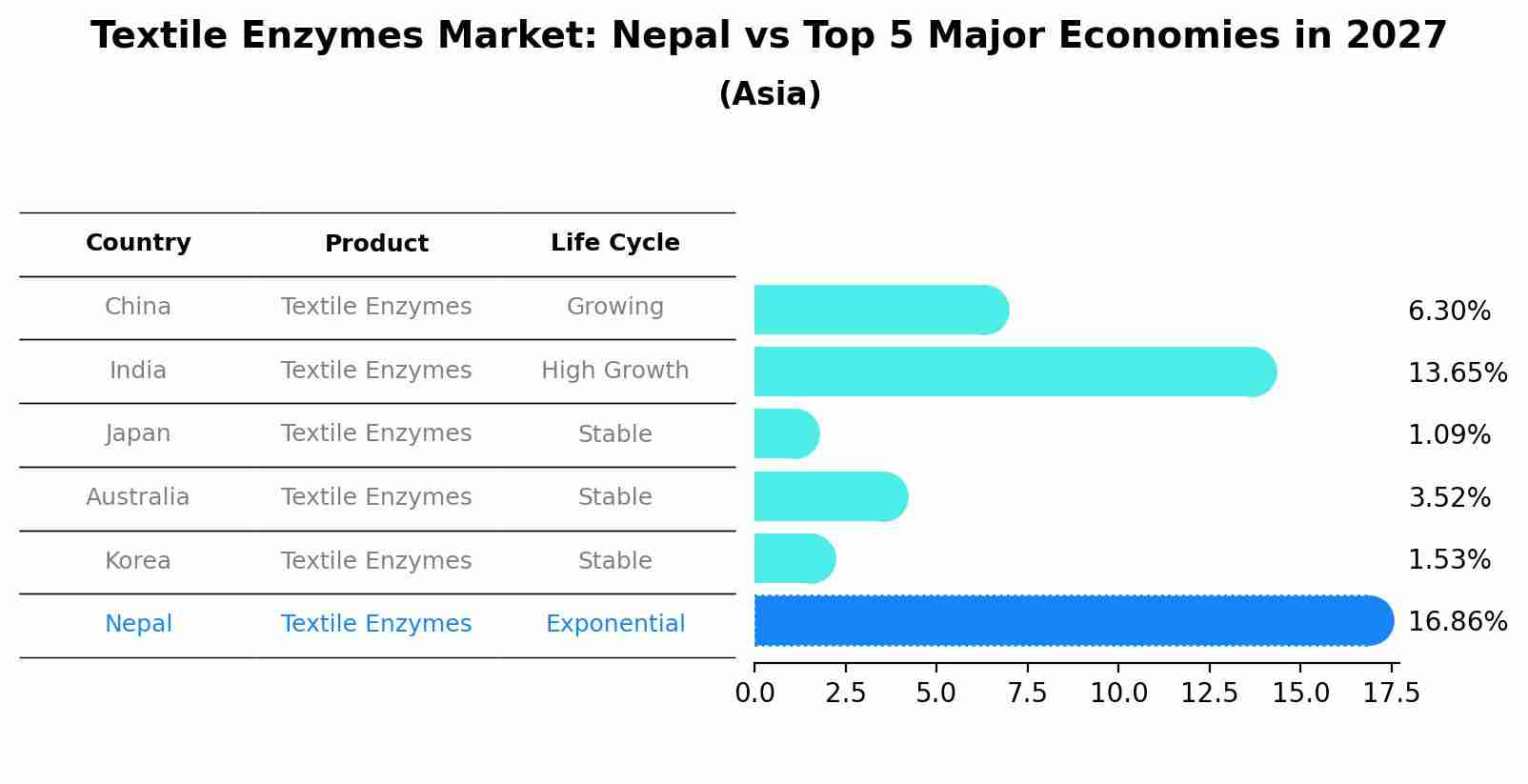Nepal Textile Enzymes Market (2025-2031) Outlook | Industry, Trends, Value, Size, Forecast, Analysis, Revenue, Growth, Companies & Share
| Product Code: ETC094075 | Publication Date: Jun 2021 | Updated Date: Jun 2025 | Product Type: Report | |
| Publisher: 6Wresearch | Author: Summon Dutta | No. of Pages: 70 | No. of Figures: 35 | No. of Tables: 5 |
Nepal Textile Enzymes Market Size Growth Rate
The Nepal Textile Enzymes Market is projected to witness mixed growth rate patterns during 2025 to 2029. The growth rate begins at 11.08% in 2025, climbs to a high of 17.86% in 2028, and moderates to 14.38% by 2029.

Textile Enzymes Market: Nepal vs Top 5 Major Economies in 2027 (Asia)
Nepal's Textile Enzymes market is anticipated to experience a exponential growth rate of 16.86% by 2027, reflecting trends observed in the largest economy China, followed by India, Japan, Australia and South Korea.

Nepal Textile Enzymes Market Overview
The Nepal Textile Enzymes Market is witnessing steady growth due to increasing demand for sustainable and eco-friendly textile processing solutions. Enzymes are being increasingly used in the textile industry for processes such as desizing, bio-polishing, and stone-washing, among others, as they offer several advantages such as reduced water and energy consumption, lower chemical usage, and improved product quality. Key players in the market are focusing on developing innovative enzyme solutions tailored to the specific needs of the Nepalese textile industry, driving the market forward. The market is also benefiting from growing awareness among textile manufacturers regarding the environmental impact of traditional textile processing methods, leading to a shift towards enzyme-based solutions. Overall, the Nepal Textile Enzymes Market is poised for further expansion in the coming years as sustainability becomes a key priority in the textile industry.
Nepal Textile Enzymes Market Trends
The Nepal Textile Enzymes Market is currently witnessing a growing demand for eco-friendly and sustainable solutions in textile processing. Enzymes are increasingly being used in various stages of textile production, such as desizing, scouring, and bio-polishing, to reduce water and energy consumption, as well as chemical usage. Manufacturers are focusing on developing enzyme products that are more efficient, cost-effective, and environmentally friendly. Additionally, there is a rising awareness among consumers about the environmental impact of traditional textile processing methods, leading to a shift towards enzyme-based solutions. The market is also seeing a trend towards customization and specialty enzymes to meet the specific requirements of different textile applications, driving innovation and product development in the industry.
Nepal Textile Enzymes Market Challenges
In the Nepal Textile Enzymes Market, several challenges are faced, including limited awareness and understanding of the benefits of using enzymes in textile processing among manufacturers. Additionally, there is a lack of skilled labor with the expertise to effectively utilize enzymes in the production process. Infrastructure limitations, such as inconsistent power supply and inadequate wastewater treatment facilities, also hinder the widespread adoption of textile enzymes in Nepal. Furthermore, the high cost of enzymes and the availability of cheaper alternatives pose a challenge for manufacturers looking to integrate enzyme-based solutions into their operations. Overcoming these obstacles will require targeted educational campaigns, investment in workforce training, and improvements in infrastructure to support the growth of the textile enzymes market in Nepal.
Nepal Textile Enzymes Market Investment Opportunities
In the Nepal Textile Enzymes Market, there are several promising investment opportunities for savvy investors. Enzymes are increasingly being used in the textile industry to improve processes like desizing, bio-polishing, and dyeing, leading to cost savings and sustainability benefits. Investing in companies that produce or distribute textile enzymes can be lucrative as the demand for eco-friendly solutions in the textile sector continues to rise. Additionally, there is potential for growth in research and development of new enzyme technologies tailored specifically for the Nepalese textile market. Collaborating with local textile manufacturers to provide enzyme solutions could also be a strategic investment opportunity. Overall, investing in the Nepal Textile Enzymes Market presents a chance to capitalize on the growing trend towards sustainable practices in the textile industry.
Nepal Textile Enzymes Market Government Policy
The Nepal government has implemented policies to promote the growth of the textile enzymes market in the country. These policies include providing incentives and subsidies to textile enzyme manufacturers, facilitating technology transfer and collaboration with international partners, and supporting research and development initiatives in the sector. Additionally, the government is focused on promoting sustainable practices in the textile industry, which aligns with the increasing global demand for eco-friendly products. By creating a favorable regulatory environment and supporting innovation, the government aims to enhance the competitiveness of Nepal`s textile enzymes market and contribute to the overall growth of the textile industry in the country.
Nepal Textile Enzymes Market Future Outlook
The Nepal Textile Enzymes Market is poised for steady growth in the coming years as the textile industry in Nepal continues to expand. Factors such as increasing demand for eco-friendly and sustainable textile processing solutions, coupled with advancements in enzyme technology, are driving the market forward. Enzymes offer benefits such as reduced energy consumption, water savings, and improved product quality, making them an attractive choice for textile manufacturers looking to enhance their sustainability credentials. Additionally, the growing awareness among consumers regarding the environmental impact of traditional textile processing methods is expected to further boost the adoption of textile enzymes in Nepal. Overall, the market is likely to experience sustained growth as the textile industry in Nepal embraces more sustainable and efficient production practices.
Key Highlights of the Report:
- Nepal Textile Enzymes Market Outlook
- Market Size of Nepal Textile Enzymes Market, 2021
- Forecast of Nepal Textile Enzymes Market, 2031
- Historical Data and Forecast of Nepal Textile Enzymes Revenues & Volume for the Period 2021 - 2031
- Nepal Textile Enzymes Market Trend Evolution
- Nepal Textile Enzymes Market Drivers and Challenges
- Nepal Textile Enzymes Price Trends
- Nepal Textile Enzymes Porter's Five Forces
- Nepal Textile Enzymes Industry Life Cycle
- Historical Data and Forecast of Nepal Textile Enzymes Market Revenues & Volume By Type for the Period 2021 - 2031
- Historical Data and Forecast of Nepal Textile Enzymes Market Revenues & Volume By Cellulase for the Period 2021 - 2031
- Historical Data and Forecast of Nepal Textile Enzymes Market Revenues & Volume By Amylase for the Period 2021 - 2031
- Historical Data and Forecast of Nepal Textile Enzymes Market Revenues & Volume By Catalase for the Period 2021 - 2031
- Historical Data and Forecast of Nepal Textile Enzymes Market Revenues & Volume By Pectinase for the Period 2021 - 2031
- Historical Data and Forecast of Nepal Textile Enzymes Market Revenues & Volume By Laccase for the Period 2021 - 2031
- Historical Data and Forecast of Nepal Textile Enzymes Market Revenues & Volume By Others for the Period 2021 - 2031
- Historical Data and Forecast of Nepal Textile Enzymes Market Revenues & Volume By Application for the Period 2021 - 2031
- Historical Data and Forecast of Nepal Textile Enzymes Market Revenues & Volume By Bio-polishing for the Period 2021 - 2031
- Historical Data and Forecast of Nepal Textile Enzymes Market Revenues & Volume By Desizing for the Period 2021 - 2031
- Historical Data and Forecast of Nepal Textile Enzymes Market Revenues & Volume By Enzymatic Bleaching for the Period 2021 - 2031
- Historical Data and Forecast of Nepal Textile Enzymes Market Revenues & Volume By Bioscouring for the Period 2021 - 2031
- Historical Data and Forecast of Nepal Textile Enzymes Market Revenues & Volume By Others for the Period 2021 - 2031
- Nepal Textile Enzymes Import Export Trade Statistics
- Market Opportunity Assessment By Type
- Market Opportunity Assessment By Application
- Nepal Textile Enzymes Top Companies Market Share
- Nepal Textile Enzymes Competitive Benchmarking By Technical and Operational Parameters
- Nepal Textile Enzymes Company Profiles
- Nepal Textile Enzymes Key Strategic Recommendations
Frequently Asked Questions About the Market Study (FAQs):
- Single User License$ 1,995
- Department License$ 2,400
- Site License$ 3,120
- Global License$ 3,795
Search
Thought Leadership and Analyst Meet
Our Clients
Related Reports
- Canada Oil and Gas Market (2026-2032) | Share, Segmentation, Value, Industry, Trends, Forecast, Analysis, Size & Revenue, Growth, Competitive Landscape, Outlook, Companies
- Germany Breakfast Food Market (2026-2032) | Industry, Share, Growth, Size, Companies, Value, Analysis, Revenue, Trends, Forecast & Outlook
- Australia Briquette Market (2025-2031) | Growth, Size, Revenue, Forecast, Analysis, Trends, Value, Share, Industry & Companies
- Vietnam System Integrator Market (2025-2031) | Size, Companies, Analysis, Industry, Value, Forecast, Growth, Trends, Revenue & Share
- ASEAN and Thailand Brain Health Supplements Market (2025-2031) | Strategy, Consumer Insights, Analysis, Investment Trends, Opportunities, Growth, Size, Share, Industry, Revenue, Segments, Value, Segmentation, Supply, Forecast, Restraints, Outlook, Competition, Drivers, Trends, Demand, Pricing Analysis, Competitive, Strategic Insights, Companies, Challenges
- ASEAN Bearings Market (2025-2031) | Strategy, Consumer Insights, Analysis, Investment Trends, Opportunities, Growth, Size, Share, Industry, Revenue, Segments, Value, Segmentation, Supply, Forecast, Restraints, Outlook, Competition, Drivers, Trends, Demand, Pricing Analysis, Competitive, Strategic Insights, Companies, Challenges
- Europe Flooring Market (2025-2031) | Outlook, Share, Industry, Trends, Forecast, Companies, Revenue, Size, Analysis, Growth & Value
- Saudi Arabia Manlift Market (2025-2031) | Outlook, Size, Growth, Trends, Companies, Industry, Revenue, Value, Share, Forecast & Analysis
- Uganda Excavator, Crane, and Wheel Loaders Market (2025-2031) | Strategy, Consumer Insights, Analysis, Investment Trends, Opportunities, Growth, Size, Share, Industry, Revenue, Segments, Value, Segmentation, Supply, Forecast, Restraints, Outlook, Competition, Drivers, Trends, Demand, Pricing Analysis, Competitive, Strategic Insights, Companies, Challenges
- Rwanda Excavator, Crane, and Wheel Loaders Market (2025-2031) | Strategy, Consumer Insights, Analysis, Investment Trends, Opportunities, Growth, Size, Share, Industry, Revenue, Segments, Value, Segmentation, Supply, Forecast, Restraints, Outlook, Competition, Drivers, Trends, Demand, Pricing Analysis, Competitive, Strategic Insights, Companies, Challenges
Industry Events and Analyst Meet
Whitepaper
- Middle East & Africa Commercial Security Market Click here to view more.
- Middle East & Africa Fire Safety Systems & Equipment Market Click here to view more.
- GCC Drone Market Click here to view more.
- Middle East Lighting Fixture Market Click here to view more.
- GCC Physical & Perimeter Security Market Click here to view more.
6WResearch In News
- Doha a strategic location for EV manufacturing hub: IPA Qatar
- Demand for luxury TVs surging in the GCC, says Samsung
- Empowering Growth: The Thriving Journey of Bangladesh’s Cable Industry
- Demand for luxury TVs surging in the GCC, says Samsung
- Video call with a traditional healer? Once unthinkable, it’s now common in South Africa
- Intelligent Buildings To Smooth GCC’s Path To Net Zero


















